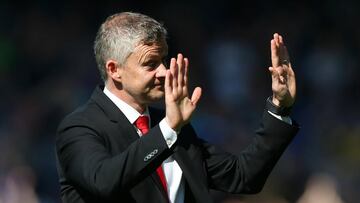Were Man United too hasty to appoint Solskjaer?
A run of six losses in eight games has led to questions about the timing of Manchester United's appointment of Ole Gunnar Solskjaer.

Ole Gunnar Solskjaer is enduring his first sticky spell as Manchester United manager, with Manchester City out to worsen the Red Devils' poor form in this week's derby.
United host City – who will retain the Premier League title if they win their last four games – on Wednesday having lost six of their past eight matches in all competitions, with Solskjaer's side suffering five away defeats in a row.
The poor form predates the Norwegian's appointment on a permanent basis, which followed a Premier League loss at Arsenal and an FA Cup exit to Wolves, but United are drifting after exiting Europe at the hands of Barcelona, though Champions League qualification remains a realistic and necessary goal.
Solskjaer inspired an incredible turnaround in United's performances when he initially succeeded Jose Mourinho in December, but was the decision to give him a three-year deal at Old Trafford the right one? We present two arguments for and against the decision
Ole is now looking ahead to Wednesday night and the visit of Manchester City. #MUFC pic.twitter.com/AvrsuOyfkh
— Manchester United (@ManUtd) April 22, 2019
United should have waited - (against)
There was a lot of pressure on executive vice-chairman Ed Woodward to confirm Solskjaer's future but, with the benefit of hindsight, that seems strange – it is not like other clubs were jostling for his signature.
The warning signs were already there with United's 1-0 January win away to Tottenham coming primarily thanks to a mixture of poor Spurs finishing and a series of remarkable saves from David de Gea.
Solskjaer's motivational skills in lifting a downbeat dressing room after Mourinho's departure should not be written off, with Paul Pogba in particular a changed man since the Portuguese's exit, but his tactical acumen appears more questionable.
United have had success playing with a split forward line and Jesse Lingard roving through the middle, but with the Red Devils beginning to look leggy that plan no longer seems to work. Solskjaer's side were nothing short of a rabble in losing 4-0 at Everton on Sunday.
Coming from behind to knock Paris Saint-Germain out of the Champions League with a much-depleted squad was an incredible feat, but the manner of the win – Thilo Kehrer's awful performance, PSG's implosion and United's VAR-assisted penalty – indicated there was an element of luck.
Good managers make their own luck, of course, but United's form in recent weeks suggests Solskjaer's reserves of fortune may already be diminished. The club should have waited until the end of the season before making a call on his future.
There is little in Solskjaer's managerial CV to suggest he is cut out for a job of this magnitude, with the rebuilding project that has been continually put off since Alex Ferguson's retirement in 2013 perhaps beyond the capabilities of Woodward and the Norwegian.
Ole might be at the wheel, but the car has stalled.
1981 - Manchester United have lost five successive away games in all competitions for the first time since March 1981 under Dave Sexton. Personality. #EVEMUN pic.twitter.com/QlmWeDiBLh
— OptaJoe (@OptaJoe) April 21, 2019
The timing was right - (for)
Solskjaer seems to reflect United on the road at the moment - he just can't win.
The plaudits who hailed him as an unquantifiable genius in those first few months look as misguided as the naysayers who now claim he got the job due to emotionally charged insanity. Those who have argued both things are just odd.
When he took over from Mourinho, who left United so poisoned with vitriol that he seemed to hate his job and everyone he shared a room with by the end of it, the optimism Solskjaer restored was as immediate as it was welcome.
He won 14 of his first 17 games in charge, including trips to Tottenham, Arsenal, Chelsea and PSG. He reached the Champions League quarter-finals - a usual minimum requirement for United to meet predicted revenues. He bridged an 11-point gap to the top four. He smiled - all the time. The players did, too.
Ole’s at the wheel! We can confirm that Ole Gunnar Solskjaer has been appointed as #MUFC manager.
— Manchester United (@ManUtd) March 28, 2019
How could he not be rewarded with the full-time job?
No, Solskjaer does not have years of experience coaching clubs of this magnitude. Neither did Mauricio Pochettino before he left Southampton for Tottenham. His work in north London has been unquestionably brilliant, but why does that make him a cast-iron guarantee to solve United's problems better than Solskjaer? And how, more pertinently, can we be sure he would have sped away from the prospect of Spurs' first Champions League semi-final at a stunning new stadium to take over a lesser football team with substantial concerns, just because United asked?
What's more, if the Norwegian was going to get the job, it had to be at that point. Look at his pre-Everton comments, where he openly questioned the attitude of some players, as though predicting the contemptible performance that was to follow. Afterwards, he made it clear that many of the squad will not be around long enough to make amends.
Related stories
By being appointed before the end of the season, Solskjaer can judge his squad outside the context of that early 'bounce' and see who is prepared to keep on working for a spot in his grand design. Waiting would have denied him - or any other choice - this insight and given him days rather than weeks to plan a transfer window and pre-season.
This was always going to be a tricky time. Solskjaer has earned the right to guide United through it.